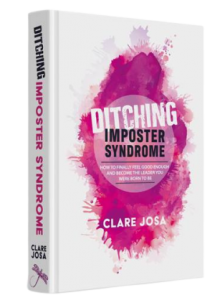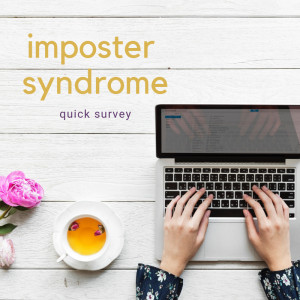The 2019 Imposter Syndrome Research Study showed that 77% of women and 60% of men who struggled with Imposter Syndrome regularly compare themselves to others and judge themselves to be lacking, even if the external evidence shows the opposite. These figures were even higher when I looked at just entrepreneurs, who tend to spend more time online and on social media, so have more opportunity to compare themselves with others.
Social media is full of glossy images of people looking their best, doing amazing things and wanting the world to validate and accept them, even if that’s not our conscious intention when we share such posts. And the social media sites’ algorithms mean that the images that show up in our feed are the most popular – so we’re not just comparing our 6am-start bags-under-the-eyes grogginess with someone else’s ‘highlight reel’.
We compare our lives with the algorithm’s curated list of the best of someone else’s. It’s far too easy to find ourselves lacking.
And this can be a massive trigger for Imposter Syndrome.
Despite what we might think about the world of internet trolls, our harshest critic is still the one inside us. And that’s when Imposter Syndrome comes out to play.
Comparisonitis forgets that we don’t see the struggle and stress others went through, so we make assumptions about how easy it was for them. Imposter Syndrome gets us writing our own success off as luck, whilst we conclude that they must have talent to be achieving so much.
When we compare ourselves to others and judge ourselves to be lacking, it can cause us to give up on our dreams. Our confidence nose dives, we pour a swimming pool full of ice-cold water onto the fire of our ambitions and we grind to a halt on taking inspired action. We are subconsciously giving our power over what we will achieve and create to the person we compared ourselves to, despite the fact that they never asked for it.
You'll never achieve your dreams while you're obsessing about what others are doing - or what they might think of you.Click To TweetThe more you deal with your hidden inner blocks and secret confidence-trashers, the less you’ll feel the need to compare yourself with others;
and the less it will bother you, even if you do.
Comparisonitis causes us to forget what we can do, dismissing our achievements with a single ‘but’.
Each of us is on a unique journey, but it takes courage and perspective to see that. Comparing ourselves to others drains our energy and confidence. It can even cause us to secretly resent their success, feeling that life is somehow not ‘fair’, triggering the biochemical reactions of the emotion better known as ‘jealousy’ in your body, the self-talk thoughts, and the emotions that go with that mind-story.
It also makes us more likely to self-sabotage, because those judgemental mind-stories programme us to believe that success is ‘bad’ and will cause resentment and jealousy from others; that they’ll no longer like us if we succeed. The stories we tell ourselves about others make us worry that others may say the same about us, if we allow ourselves to be successful. This can be a key factor for someone not applying for a promotion or opportunity they know they deserve, or from not ‘owning’ their achievements after a successful project and attributing them to the wider team.
When you are truly comfortable in your own skin, the need to compare yourself to others disappears. Is it finally time to ditch Imposter Syndrome? Click To TweetThe ability for others to unwittingly press the buttons you have cleared out disappears. And you reach a stage where secret jealousy and resentment no longer play a part in your 3 a.m. dialogue.
On those few occasions when it does, it’s always possible to turn it into an opportunity to listen to your inner wisdom and make changes.
My book Ditching Imposter Syndrome guides you through exactly how to do this. And I show you exactly how to set yourself free from the curse of comparisonitis on page 202. So if you’re hungry to finally feel good enough and to become the leader you were born to be, make sure you’ve got your copy of Ditching Imposter Syndrome here.












